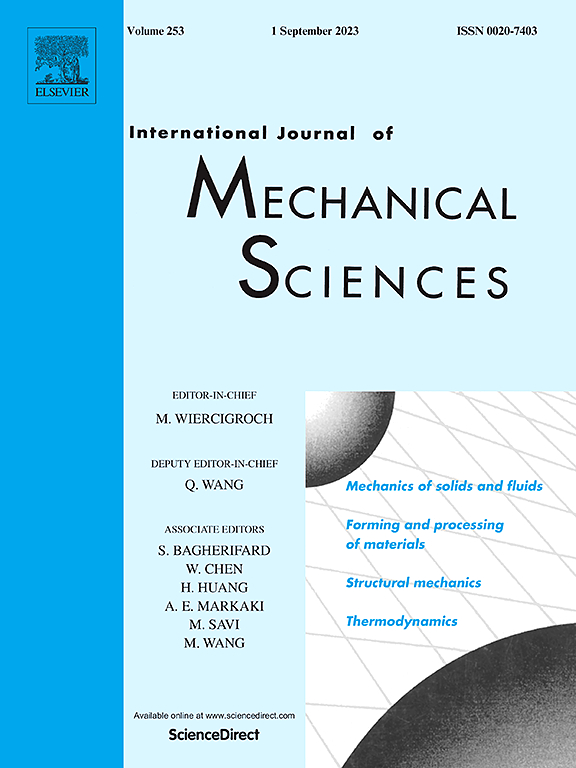Aero-engine blade error distributions predictions using novel machine learning models
IF 7.1
1区 工程技术
Q1 ENGINEERING, MECHANICAL
International Journal of Mechanical Sciences
Pub Date : 2025-04-22
DOI:10.1016/j.ijmecsci.2025.110262
引用次数: 0
Abstract
The milling of thin-walled aero-engine blades presents substantial challenges due to their complex geometry. Accurate prediction of milling error distributions is critical for ensuring machining stability and precision. However, traditional mechanistic models suffer from high complexity and limited adaptability, and most existing data-driven methods often predict only single error values without capturing the full distribution of errors. To bridge this gap, this study proposes a novel Gaussian Mixture Model-based Error Distribution Prediction (GMM-EDP) framework that models the probability distribution of milling errors rather than just point estimates, which, to our knowledge, has not been done in prior studies. Two high-quality experimental datasets were generated after milling 44 blades and 34 impellers, incorporating key machining parameters as inputs. The GMM-EDP framework uses a Gaussian mixture model to characterize complex error distributions and a multi-output machine learning model to predict distributional features. Comprehensive evaluation using Jensen–Shannon divergence, Hellinger distance, total variation distance, and root mean square error (RMSE) demonstrates the framework’s accuracy and robustness. The proposed approach shows excellent generalization across different machining conditions. Results confirm that the GMM-EDP framework not only significantly improves the precision of milling error predictions but also provides deeper insights into machining consistency and uncertainty, which are critical for optimizing process parameters and improving the quality and reliability of thin-walled blade production.

利用新型机器学习模型预测航空发动机叶片误差分布
由于其复杂的几何形状,薄壁航空发动机叶片的铣削面临着巨大的挑战。铣削误差分布的准确预测是保证加工稳定性和精度的关键。然而,传统的机制模型复杂性高,适应性有限,现有的大多数数据驱动方法往往只能预测单个误差值,而不能捕捉到误差的完整分布。为了弥补这一差距,本研究提出了一种新的基于高斯混合模型的误差分布预测(GMM-EDP)框架,该框架模拟铣削误差的概率分布,而不仅仅是点估计,据我们所知,这在先前的研究中尚未完成。以关键加工参数为输入,铣削44个叶片和34个叶轮后生成两个高质量的实验数据集。GMM-EDP框架使用高斯混合模型来表征复杂的误差分布,使用多输出机器学习模型来预测分布特征。利用Jensen-Shannon散度、Hellinger距离、总变异距离和均方根误差(RMSE)进行综合评价,证明了该框架的准确性和鲁棒性。该方法在不同的加工条件下具有良好的通用性。结果证实,GMM-EDP框架不仅显著提高了铣削误差预测的精度,而且对加工一致性和不确定性提供了更深入的了解,这对于优化工艺参数、提高薄壁叶片生产的质量和可靠性至关重要。
本文章由计算机程序翻译,如有差异,请以英文原文为准。
求助全文
约1分钟内获得全文
求助全文
来源期刊

International Journal of Mechanical Sciences
工程技术-工程:机械
CiteScore
12.80
自引率
17.80%
发文量
769
审稿时长
19 days
期刊介绍:
The International Journal of Mechanical Sciences (IJMS) serves as a global platform for the publication and dissemination of original research that contributes to a deeper scientific understanding of the fundamental disciplines within mechanical, civil, and material engineering.
The primary focus of IJMS is to showcase innovative and ground-breaking work that utilizes analytical and computational modeling techniques, such as Finite Element Method (FEM), Boundary Element Method (BEM), and mesh-free methods, among others. These modeling methods are applied to diverse fields including rigid-body mechanics (e.g., dynamics, vibration, stability), structural mechanics, metal forming, advanced materials (e.g., metals, composites, cellular, smart) behavior and applications, impact mechanics, strain localization, and other nonlinear effects (e.g., large deflections, plasticity, fracture).
Additionally, IJMS covers the realms of fluid mechanics (both external and internal flows), tribology, thermodynamics, and materials processing. These subjects collectively form the core of the journal's content.
In summary, IJMS provides a prestigious platform for researchers to present their original contributions, shedding light on analytical and computational modeling methods in various areas of mechanical engineering, as well as exploring the behavior and application of advanced materials, fluid mechanics, thermodynamics, and materials processing.
 求助内容:
求助内容: 应助结果提醒方式:
应助结果提醒方式:


